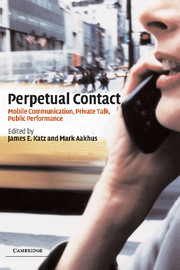Book contents
- Frontmatter
- Contents
- List of figures
- List of tables
- Notes on the contributors
- Preface and acknowledgments
- 1 Introduction: framing the issues
- PART I Mobile communication: national and comparative perspectives
- 2 Finland: a mobile culture
- 3 Israel: chutzpah and chatter in the Holy Land
- 4 Italy: stereotypes, true and false
- 5 Korea: personal meanings
- 6 United States: popular, pragmatic and problematic
- 7 France: preserving the image
- 8 The Netherlands and the USA compared
- 9 Bulgaria: mobile phones as post-communist cultural icons
- PART II Private talk: interpersonal relations and micro-behavior
- PART III Public performance: social groups and structures
- Appendixes
- Index
- References
5 - Korea: personal meanings
Published online by Cambridge University Press: 22 September 2009
- Frontmatter
- Contents
- List of figures
- List of tables
- Notes on the contributors
- Preface and acknowledgments
- 1 Introduction: framing the issues
- PART I Mobile communication: national and comparative perspectives
- 2 Finland: a mobile culture
- 3 Israel: chutzpah and chatter in the Holy Land
- 4 Italy: stereotypes, true and false
- 5 Korea: personal meanings
- 6 United States: popular, pragmatic and problematic
- 7 France: preserving the image
- 8 The Netherlands and the USA compared
- 9 Bulgaria: mobile phones as post-communist cultural icons
- PART II Private talk: interpersonal relations and micro-behavior
- PART III Public performance: social groups and structures
- Appendixes
- Index
- References
Summary
Introduction
According to recent statistics, almost half of the entire South Korean population, which exceeds 40 million, use a mobile phone (see table 5.1). Considering that the expression “mobile phone,” which is usually called a “hand phone” in Korea, was quite unfamiliar to most Koreans until a few years ago, the rapid diffusion of the cellular technology and its quick adoption are certainly an interesting phenomenon.
The popularity of mobile phones in Korea is most evident among young people and males (tables 5.2 and 5.3). Seven out of ten college students who are taking my courses always bring a phone to class, forcing me to continually ask them to turn it off. To enforce this rule, I even devised a penalty. The offender must sing a song in front of the class, if his or her phone rings during class.
Young people's enthusiastic adoption of cellular phones is also evident in Japan. According to a recent newspaper report entitled “Cell Phone as Teen Talisman,” teenagers spend 20% of their allowance or expendable income on cellular phone bills, in a country where two out of five use mobile phones (Yomiuri Shimbun, 1999).
The introduction of mobile communication technology will undoubtedly affect traditional patterns of social interaction. History shows that new communication technologies, such as the telephone, television, computer, etc., have brought about social and cultural changes.
- Type
- Chapter
- Information
- Perpetual ContactMobile Communication, Private Talk, Public Performance, pp. 63 - 79Publisher: Cambridge University PressPrint publication year: 2002
References
- 26
- Cited by



